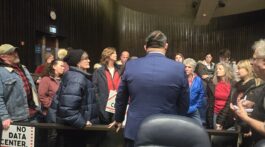by Abdul-Hakim Shabazz
I decided to take a break from my own defamation-related lawsuits and focus on this one—the latest skirmish in the Indiana Republican Party’s never-ending family feud. A group of insurgents, still smarting from convention floor defeats, has sued the state party and its leaders, claiming they trampled rules, cut microphones, and ran roughshod over Robert’s Rules of Order. On paper, it’s styled as a derivative action “on behalf of the Party.” In practice, it looks more like a political press release with a docket number.
Let’s be real: courts don’t like playing referee in intramural food fights. Unless you can show a clear contractual right, a property interest, or a statutory violation, judges usually want no part of telling private associations how to run their meetings. That’s the doctrine of “political question.” Translation: thanks, but no thanks. The First Amendment gives parties and other voluntary groups wide latitude to run their own affairs, even if that means shutting down debate or rewriting rules midstream. If the U.S. Supreme Court won’t stop Democrats from tinkering with superdelegates, no Marion County judge is about to micromanage the Indiana GOP’s convention.
The plaintiffs know this, so they’ve tried a clever packaging trick—casting the case as a corporate derivative action. The argument is that party leaders, as officers of a nonprofit corporation, breached duties owed to members. Creative? Sure. Likely to succeed? Not really. Even if you accept that delegates are “members,” courts still hesitate to second-guess parliamentary rulings, especially when the organization’s own rules make the state committee the “supreme authority.” That’s a brick wall, not a speed bump.
And there’s the small matter of timing. Some of the grievances trace back to the 2022 convention. Indiana’s statute of limitations isn’t exactly generous for claims like breach of fiduciary duty or ultra vires acts. If the clock has already expired, the court won’t restart it just because someone’s still angry about a microphone getting cut off two years ago.
So legally, this case is a longshot. Judges are more likely to toss it on standing, jurisdiction, or timeliness than to spend a minute re-litigating who got to offer a resolution on the convention floor.
But politically? That’s where it gets interesting. Lawsuits can be lousy legal strategy but great political theater. Even if the case dies in a motion to dismiss, the insurgents get to say they’re “taking on the establishment” in court. They can post filings on social media, send fundraising emails, and keep the narrative alive: party bosses silencing the grassroots, rules ignored, delegates muzzled. It’s a story tailor-made for activists who already believe the system is rigged.
And let’s be honest, irony abounds. The very process that produced insurgent victories like Micah Beckwith’s win for lieutenant governor is now being cast as illegitimate because it didn’t deliver more. Consistency is not the point here. Momentum is. And nothing fuels momentum like the image of plucky underdogs dragging leadership into court.
The reality is the battlefield remains politics, not litigation. If the rebels want to change the party, they have to do it the old-fashioned way: organize precincts, win county chair races, stack rules committees, and show up with more bodies when the gavel drops. Courts won’t open the doors. Delegates will.
Bottom line: as a lawsuit, this is going nowhere. As politics, it’s a loudspeaker. And in Indiana, where optics matter as much as arithmetic, that loudspeaker could be just enough lighter fluid to keep the GOP’s internal fires burning well into 2026.











